新目标英语七年级下Unit 11 说课稿
英语人教版七年级下册unit11说课稿

Unit11 How was your school trip?说课稿
Section A period 1 (1a-2c)
我今天和大家一起学习的的是新目标人教版七年级下册Unit11 How was your school trip? Section A period 1 (1a-2c) 的内容。
本着新课程的新的教学理念,一切以学生为中心,为了每个学生的发展。
我所采用的教学方法是任务教学法,活动教学法,合作教学法等互相融合交叉使用。
过程如下
1导入展示:以短片形式导入并展示语法:这样设计是吸引学生的注意力,引起学生的学习兴趣和激起他们的求知欲。
情节形象逼真,对语法的印象也会大大加深。
2语言操练:本节课进行了大量的语言操作,这样设计是因为本教材的设计结构特点。
SectionA为语言的输入,所以此环节是加强学生对本单元的目标语言的掌握程度的。
3听力训练:播放两遍或三遍,这样设计是因为七年级教师要侧重对学生听了策略的渗透,这样为以后突破更难的听力测试打下良好的基础,所以指导学生每一遍的听力目的和侧重是本环节的重点4达标测评:设计目的:检查学生对语言点的掌握,错误可以及时纠正。
语法融入语言,不片面,不孤立,水到渠成。
5 作业:写出自己的校游经历。
设计目的听说读写四种技能缺一
不可。
七年级英语下册Unit11Howwasyourschooltrip说课稿新版人教新目标版
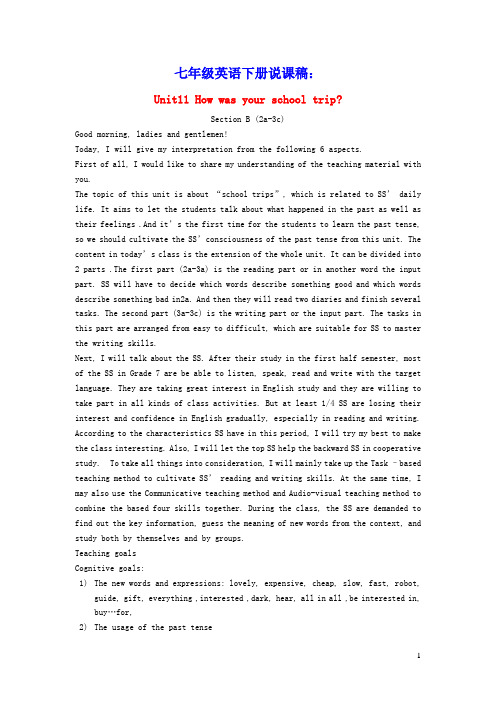
七年级英语下册说课稿:Unit11 How was your school trip?Section B (2a-3c)Good morning, ladies and gentlemen!Today, I will give my interpretation from the following 6 aspects.First of all, I would like to share my understanding of the teaching material with you.The topic of this unit is about “school trips”, which is related to SS’ daily life. It aims to let the students talk about what happened in the past as well as their feelings .And it’s the first time for the students to learn the past tense, so we should cultivate the SS’consciousness of the past tense from this unit. The content in today’s class is the extension of the whole unit. It can be divided into 2 parts .The first part (2a-3a) is the reading part or in another word the input part. SS will have to decide which words describe something good and which words describe something bad in2a. And then they will read two diaries and finish several tasks. The second part (3a-3c) is the writing part or the input part. The tasks in this part are arranged from easy to difficult, which are suitable for SS to master the writing skills.Next, I will talk about the SS. After their study in the first half semester, most of the SS in Grade 7 are be able to listen, speak, read and write with the target language. They are taking great interest in English study and they are willing to take part in all kinds of class activities. But at least 1/4 SS are losing their interest and confidence in English gradually, especially in reading and writing. According to the characteristics SS have in this period, I will try my best to make the class interesting. Also, I will let the top SS help the backward SS in cooperative study. To take all things into consideration, I will mainly take up the Task –based teaching method to cultivate SS’ reading and writing skills. At the same time, I may also use the Communicative teaching method and Audio-visual teaching method to combine the based four skills together. During the class, the SS are demanded to find out the key information, guess the meaning of new words from the context, and study both by themselves and by groups.Teaching goalsCognitive goals:1)The new words and expressions: lovely, expensive, cheap, slow, fast, robot,guide, gift, everything ,interested ,dark, hear, all in all ,be interested in, buy…for,2)The usage of the past tense3)How to describe feelingsAbility goals:1)Improve SS’ reading such as skimming and scanning2)Improve SS’ writing skills3)Develop SS’comprehensive skillsMoral goals:1)Encourage SS to keep diaries2)Encourage SS to spend their free time properly3)Encourage SS to express their feeling in a right way.The key points:1)The usage of the new words and expressions2)The application of past tense in reading and writingThe difficult points:1)Understand the text ,and get the key information2)Use what they learnt to write a diaryTeaching procedureStep1 Warm-up1) Let’s make a list of description wordsBefore the class, Ialways ask the SS to prepare for class as a usual practice .This time I will ask them to collect some description words in groups .Then when the class begins, we’ll have a competition to write their words on the blackboard. At last, I’ll give some of them small presents.The purpose of this competition is to encourage the Ss to preview the class actively .It also help to arouse SS interest and activate their prior knowledge.2) Make a complement and finish 2a.I will make a proper complement on the situation. And then give them a short time to finish 2a. After that, I will let some SS to read, translate and give their answers .Finally, read the words three times together.Through this part, I want to check how much the SS understand these words. And after being familiar with these words, SS will be able to finish other tasks more quickly and easily.Step 2 Pre-reading (Lead-in &Presentation)I will create a situation that we are going to have a school trip to a sciencemuseum.I play the role as a “guide”. As the trip goes on, some pictures will be showed on screen and some new words (guide, robot, gi ft…) will be taught.Creating the trip situation can not only help the students learn the new words in a half-real situation so that they can master the new words quickly and deeply, but also increase the fun of teaching. This part plays a connecting role.Step 3 While –readingPart1 Faster reading1) I’ll ask the students to read the two diaries for the first time and answer the followingquestions.Q1: Did Helen and Jim go on the same trip? How can you decide?Q2: Did they have the same feelings about the trip?Q3: Howdo they feel about the trip?2) Read the two diaries for the second time and underline the descriptions words which describe good things and circle the ones that describe the bad things.3) Read for the third time and complete the chart in 2c.4) Check the answers by a group work. Three students in a group,one is the interviewer,another is Helen ,the other is Jim. They will ask like this “How was/were…?”In this part,Ss can develop their abilities of catching the key information as well as the some reading skills such as skimming and scanning. Ss may have a general understanding of the two diaries by finishing small tasks. While doing the tasks, they can get a sense of success.Part 2 Diary by diary reading (Careful reading)1)Read Helen’s diaryLet the SS read Helen’s diary carefully and find out the difficult sentences or phrases they don’t understand .And then I will explain the language points. Next, letthem to read aloud with the right emotion. At last, I will give them several minutes to retell the diary with partners, after that I will pick up someone to retell in front of the class according to the outline on the screen.2)Read Jim’s diaryFor this part, I don’t want them to read directly. I want to make the verbs missing and let them fill in the blanks with the words in the box. And then check the answers by listening to the tape. Next, let them read loudly and try to retell the diary. If time is enough, I will let some of them to retell just according to some verbs.Careful reading is necessary for the SS to read better. The students are in the period when they need to accumulate language materials. With some useful explanation, they can write easily.Step4Post-reading1)Let’s help Bob and Linda complete their diaries in 3a and 3b .First, I willanalyze the three pictures and the key sentences in each diary with my class, and let them think out some phrases or description words to fill in the blanks.2)Do a quick survey by asking “who has the habit of keeping a diary”,andencourage Ss to keep diaries.3)Tell the SS some keys points about writing diaries and ask them to write adiary for their own school trips by themselves. After writing, I will ask several SS to show their diaries in front of the class and give them some comments.Step5 ConclusionCheck what we have learnt today by reading the words or phrases on the blackboard. That is my teaching procedure. After the class, I will put up the good diaries of my SS on the wall to encourage them to write. And I will make a reflection and try my best to perfect my class. That’s all ,thank you for listening!。
七年级英语下册Unit11Howwasyourschooltrip说课稿(人教新目标版)
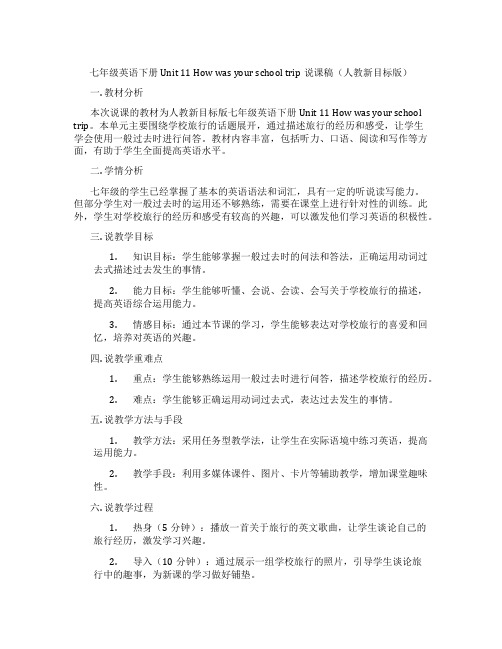
七年级英语下册 Unit 11 How was your school trip说课稿(人教新目标版)一. 教材分析本次说课的教材为人教新目标版七年级英语下册Unit 11 How was your school trip。
本单元主要围绕学校旅行的话题展开,通过描述旅行的经历和感受,让学生学会使用一般过去时进行问答。
教材内容丰富,包括听力、口语、阅读和写作等方面,有助于学生全面提高英语水平。
二. 学情分析七年级的学生已经掌握了基本的英语语法和词汇,具有一定的听说读写能力。
但部分学生对一般过去时的运用还不够熟练,需要在课堂上进行针对性的训练。
此外,学生对学校旅行的经历和感受有较高的兴趣,可以激发他们学习英语的积极性。
三. 说教学目标1.知识目标:学生能够掌握一般过去时的问法和答法,正确运用动词过去式描述过去发生的事情。
2.能力目标:学生能够听懂、会说、会读、会写关于学校旅行的描述,提高英语综合运用能力。
3.情感目标:通过本节课的学习,学生能够表达对学校旅行的喜爱和回忆,培养对英语的兴趣。
四. 说教学重难点1.重点:学生能够熟练运用一般过去时进行问答,描述学校旅行的经历。
2.难点:学生能够正确运用动词过去式,表达过去发生的事情。
五. 说教学方法与手段1.教学方法:采用任务型教学法,让学生在实际语境中练习英语,提高运用能力。
2.教学手段:利用多媒体课件、图片、卡片等辅助教学,增加课堂趣味性。
六. 说教学过程1.热身(5分钟):播放一首关于旅行的英文歌曲,让学生谈论自己的旅行经历,激发学习兴趣。
2.导入(10分钟):通过展示一组学校旅行的照片,引导学生谈论旅行中的趣事,为新课的学习做好铺垫。
3.新课呈现(15分钟):讲解一般过去时的问法和答法,示例说明如何用动词过去式描述过去发生的事情。
让学生跟读、模仿,确保正确掌握。
4.实践环节(15分钟):学生分角色扮演,模拟学校旅行的场景,运用一般过去时进行问答。
新目标英语七年级下册Unit11WhatdoyouthinkofgameshowsRevision教学设计

Unit 11 What do you think of game shows (Revision) 教学设计 一,教材与学情分析: 本堂课为复习课.学生已经掌握了本单元的词汇和句型,学会了如何用 "What do you think of …"来询问他人对某事或某物的看法,并且能够用 "I love it/them. I don't mind it/them. I can't stand it/them…"来表述自己的观点.因此本堂复习课的内容定位为:1,复习词汇和句 型;2,用 school life 的话题引出几个不同的分话题,创设一个 CCTV 的 talk show 的情境让学 生综合运用词汇和句型来表达喜好和观点;3,再由之前 talk show 的形式引出本课 Rose Smith 的 talk show,进行预测,听取信息,提问等形式的处理后,引出学生对 old people's looks 的 观点;4,不同的人对事情有不同的看法,列出几个观点,让学生进行评论. 二,教学目标 1.语言技能目标: ⑴学会询问别人的看法,如: What do you think of game shows ⑵学会表达喜好和观点,如: I like them./I don't mind them. 2.语言知识目标: ⑴能掌握关于 TV shows 和 fashion 的一些基本词汇; ⑵能正确运用 what do you think of 来询问看法,如: What do you think of game shows ⑶能正确运用 love/like/don't mind/can't stand 等词汇来表述观点,如 I like them./I don't mind them. 3.情感态度目标: ⑴本堂课设计贴近学生实际生活,可以提高他们的学习兴趣,用英语来表达自己的观点. ⑵创设 CCTV 的 talk show 节目有利于他们发挥个体想象力,团队合作能力和协调组织能力.⑶ 针对老年人着装的问题进行讨论,关注年轻人和老年人的沟通问题,有利于学生更加了解身边 的老年人的物质,精神生活. ⑷针对一些外在的观点来进行批判地讨论并做出自己的论断,培养学生的思辨能力和独立意识. 4.学习策略目标: ⑴交际策略:通过小组合作,完成 CCTV talk show,在学习英语的同时也培养学生与人沟通的能 力. ⑵认知策略:通过与同学讨论,对于一些既定的观念进行判断和推理,形成自己的观点,培养综 合分析能力.通过猜测,鼓励学生大胆发言,学习新知. ⑶调控策略:鼓励学生运用所学的知识来探求新的知识,"温故而知新",从而提高学习效率. 三,重点难点 1.教学重点 ⑴重点词汇:fashion, sunglasses, scarf, belt, wallet, key ring, watch, TV show, game show, talk show, sitcom, sports show, sitcom. ⑵重点句型: ①What do you think of game shows ②I love/like it/them. ③I don't like/mind it/them. ④I can't stand it/them ⑶话题:fashion, TV shows, school life, old people's look. 2.教学难点⑴在 talk show 中运用句型对不同话题进行谈论,表述喜好和观点; ⑵学习 Rose Smith 的 Talk show 之后,学会如何谈论老年人的着装; ⑶能够针对一些生活中真实的看法进行简单地评论. 四,教学步骤: Step 1: Greeting (Answer and ask) Give the students some information about the teacher. Tell them they are the answers to some questions. Let the students ask the teacher questions. So they can know the teacher better. (设计说明:通过提问形式和学生拉近距离,并且在这个活动中设计了与后面活动有关的信息, 如 Talk shows 和 What do you think of Rui'an ) Step 2: Review vocabulary (describing and guessing) Divide the students into 4 groups. Take the first group as an example. Let one student come to the blackboard and face the class. The other students in the group describe the words on the screen for him. (设计说明:复习词汇,通过描述与猜测游戏,引起学生的兴趣,所复习的词汇不仅包括本单元的 词汇,也和后面的话题有关,为后面任务的顺利完成作铺垫). Step 3: Review structure. 1. T: Do you still remember my favorite kind of TV shows Yes, it's talk shows! I like talk shows a lot. What about you What do you think of talk shows S1: I don't like them. T: What about sports shows Do you like them S1: Yes, I like them very much. T: Then , what do you think of game shows S1: I don't mind them. 2. T: Just now, I asked Linda about TV shows. She likes sports shows very much, and she doesn't like talk shows. She doesn't mind game shows So, can you ask your partner their ideas about TV shows Ask them and then tell us their ideas. (设计说明:复习句型,从 TV Shows 入手,以师生对话为例,并且将询问结果以第三人称转述,要 求学生在询问搭档之后将内容转述,和大家一起分享.) Step 4: CCTV 4(中央电视台-4) talk show T: I like talk shows very much. Do you like them too Today we are going to have a talk show about ourselves. CCTV 4 is going to make a DV of a talk show "school life" in our school. Let's work in groups, one act as the host and other students are the guests. Choose one of the topics: sports, subjects, students' fashion, school activities. You may begin the talk show like this: Welcome to CCTV 4. This is the famous talk show "School Life". I am the host Lucy. Today we are going to talk about "sports" and we have 3 students from (设计说明:用 talk show 的形式将词汇,句型和话题串起来综合运用,能全面地锻炼学生的英语 综合能力.) Step 5: Rose Smith's talk show T: Your talk shows are all good, and now we will have a very special and interesting talk show. Let's listen and guess what kind of person is in the talk showT: Let's listen again and guess: what does she look like in this talk show Ask Ss to look at the picture and compare their prediction with the picture. Ask Ss to read and answer the following questions: What do people usually think of old people's looks What kinds of nice words will she hear from people What will young people think of her T: You are young people, what do you think of Rose Smith T: What about your grandmother T: What do you think your grandparents should wear (设计说明:通过预测,听录音,提问等形式处理课文,以年轻人怎么看待老年人的着装问题收尾, 引出下个环节的"不同的人有不同的观点".) Step 6: Different ideas T: Rose Smith doesn't mind what young people think of her What about you Do you mind what other people think of you T: So, sometimes opinions are important in our daily life. Here I have collected some ideas about students, parents and teachers. I want to know what you think of them. Group work: "Students should only care about study". The students need to discuss in groups and give a short report like "I can't stand the idea that students should only care about study……" Let the students have more topics "Parents should do everything for their children." "Good students shouldn't play the computer." "Good teachers should always be serious." (设计说明:此步为深化环节,针对"不同的人有不同的看法"这个引子,给出学生一些关于学生 生活实际的"观点",让学生模仿 Rose Smith 的 Talk show 的基础上表达自己对于某些观点的看 法,用英语来推理思辨,同时得出自己的结论.) Step 7. Homework Choose one of the topics and write a short passage. Read your passage to your English teacher. Email your passage to me. My email address is peng820055@ 板书设计 Unit 4 Reading--- She said helping others helped her a lot. Who is Yang Lei What did she do Why did she do that How would it help SUMMARY: Paragraph1: Teaching high school students in a poor mountain village changed the life of Yang Lei from Peking University. Paragraph2: She said young people today needed to experience different things. Paragraph 3: The students love having the volunteer teachers there. Paragraph 4: Yang Lei said she could open up her students' eyes to the outside world and give them a good start in life. Paragraph 5: She enjoyed her time as a volunteer very much. 教学反思: 1.在此长篇阅读教学中,我提供给了学生几个可以掌握的阅读技巧,在本课中学习并加以应用.取得了较好的效果.几乎所有学生都可以掌握.但在今后的阅读中还要不断的实践和使用,以利 于学生形成自己的阅读策略. 2.在学习文章之后.应给学生一定的时间实现语言应用,围绕课文开展各种形式的口,笔交际活 动,如复述课文主要内容,讨论杨蕾等志愿者的行为是否值得学习,谈谈自己对 Young people today need to experience different things.这句话的理解,仿写与课文相关的话题等,将语 言学习和语言运用统一起来,同时增强对学生的情感教育. 3. 本节课活动较多, 应注意把握好活动时间, 保证各项活动顺利完成.。
新目标七年级unit11说课稿(新)
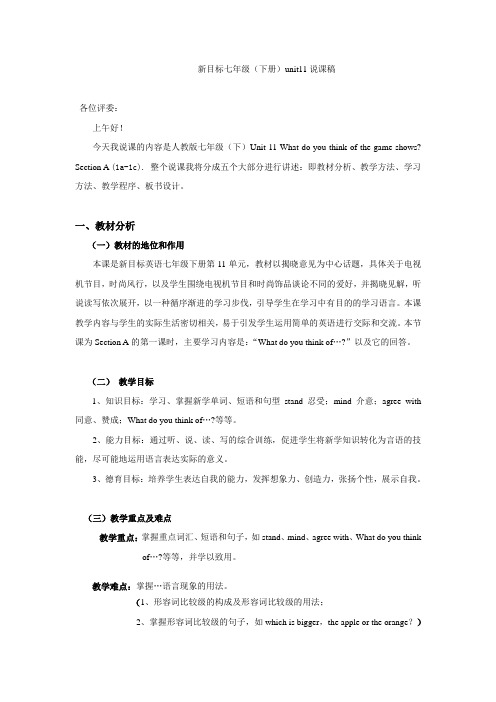
新目标七年级(下册)unit11说课稿各位评委:上午好!今天我说课的内容是人教版七年级(下)Unit 11 What do you think of the game shows? Section A (1a-1c).整个说课我将分成五个大部分进行讲述:即教材分析、教学方法、学习方法、教学程序、板书设计。
一、教材分析(一)教材的地位和作用本课是新目标英语七年级下册第11单元,教材以揭晓意见为中心话题,具体关于电视机节目,时尚风行,以及学生围绕电视机节目和时尚饰品谈论不同的爱好,并揭晓见解,听说读写依次展开,以一种循序渐进的学习步伐,引导学生在学习中有目的的学习语言。
本课教学内容与学生的实际生活密切相关,易于引发学生运用简单的英语进行交际和交流。
本节课为Section A的第一课时,主要学习内容是:“What do you think of…?”以及它的回答。
(二)教学目标1、知识目标:学习、掌握新学单词、短语和句型stand 忍受;mind 介意;agree with 同意、赞成;What do you think of…?等等。
2、能力目标:通过听、说、读、写的综合训练,促进学生将新学知识转化为言语的技能,尽可能地运用语言表达实际的意义。
3、德育目标:培养学生表达自我的能力,发挥想象力、创造力,张扬个性,展示自我。
(三)教学重点及难点教学重点:掌握重点词汇、短语和句子,如stand、mind、agree with、What do you think of…?等等,并学以致用。
教学难点:掌握…语言现象的用法。
(1、形容词比较级的构成及形容词比较级的用法;2、掌握形容词比较级的句子,如which is bigger,the apple or the orange?)二、教学方法:新教材重视以人为本,强调素质教育。
在教学中,要注意发挥学生的主体作用,把空间留给学生。
抓住初中生活泼好动,表现欲强的心理特点,课堂上我设计了大量的听、说、读、写的训练,启发学生动脑思考,鼓励学生大胆开口,畅所欲言,尽可能运用英语表达实际意义,从而最大限度地调动学生的积极性和主动性。
新目标英语七年级下册第十一单元Unit11Whatdoyout
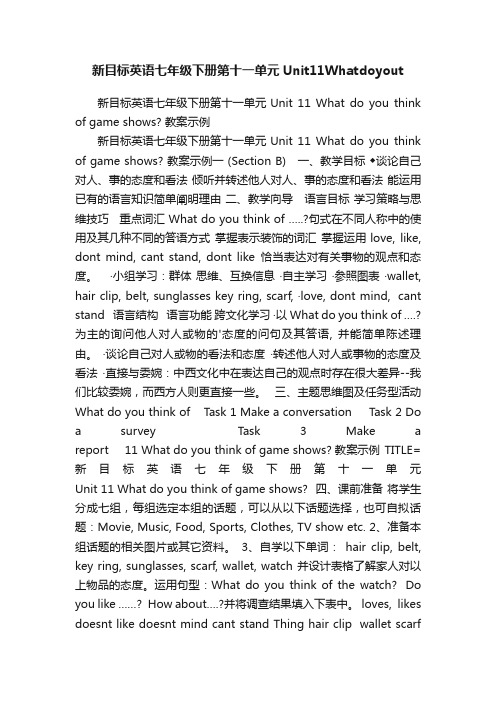
新目标英语七年级下册第十一单元Unit11Whatdoyout新目标英语七年级下册第十一单元Unit 11 What do you think of game shows? 教案示例新目标英语七年级下册第十一单元Unit 11 What do you think of game shows? 教案示例一 (Section B) 一、教学目标◆谈论自己对人、事的态度和看法倾听并转述他人对人、事的态度和看法能运用已有的语言知识简单阐明理由二、教学向导语言目标学习策略与思维技巧重点词汇What do you think of …..?句式在不同人称中的使用及其几种不同的答语方式掌握表示装饰的词汇掌握运用love, like, dont mind, cant stand, dont like恰当表达对有关事物的观点和态度。
·小组学习:群体思维、互换信息·自主学习·参照图表·wallet, hair clip, b elt, sunglasses key ring, scarf, ·love, dont mind, cant stand 语言结构语言功能跨文化学习·以What do you think of ….?为主的询问他人对人或物的'态度的问句及其答语, 并能简单陈述理由。
·谈论自己对人或物的看法和态度·转述他人对人或事物的态度及看法·直接与委婉:中西文化中在表达自己的观点时存在很大差异--我们比较委婉,而西方人则更直接一些。
三、主题思维图及任务型活动What do you think of Task 1 Make a conversation Task 2 Do a survey Task 3 Make a report 11 What do you think of game shows? 教案示例 TITLE=新目标英语七年级下册第十一单元Unit 11 What do you think of game shows? 四、课前准备将学生分成七组,每组选定本组的话题,可以从以下话题选择,也可自拟话题:Movie, Music, Food, Sports, Clothes, TV show etc. 2、准备本组话题的相关图片或其它资料。
七年级英语下册(人教版)Unit11第3课时(SectionB1a1d)说课稿

1.小组合作:让学生分组编写一段关于家庭成员和职业的对话,并进行角色扮演,提升口语表达能力。
2.个人练习:设计填空、选择、改错等练习题,让学生独立完成,巩固词汇和语法知识。
3.竞赛活动:组织一场关于家庭成员和职业的英语知识竞赛,激发学生的学习兴趣,提高课堂氛围。
3.技术工具:互动白板、网络平台等,实现课堂的实时互动、资源共享,便于学生课后复习和拓展学习。
(三)互动方式
1.师生互动:通过提问、讨论、示范等方式,引导学生积极参与课堂,关注学生的学习需求,及时给予反馈和指导。
2.生生互动:
(1)小组合作:分组进行讨论、表演等活动,培养学生的合作意识和团队精神。
(2)角色扮演:让学生扮演家庭成员或职业角色,进行对话练习,提高口语表达能力。
七年级英语下册(人教版)Unit11第3课时(SectionB1a1d)说课稿
一、教材分析
(一)பைடு நூலகம்容概述
本节课是七年级英语下册(人教版)Unit 11第三课时(Section B 1a-1d)。在整个课程体系中,本单元主要围绕“家庭成员和职业”这一主题展开,让学生学会用英语描述家庭成员及其职业。本节课是本单元的第三课时,通过学习,学生将能进一步掌握并运用有关家庭成员和职业的词汇,同时学会运用一般现在时描述家人正在做的事情。
本节课面向的是七年级学生,这个年龄段的学生具有以下特点:好奇心强,对新鲜事物充满兴趣;活泼好动,喜欢互动和参与;认知水平逐渐从具体形象思维向抽象逻辑思维转变;学习习惯方面,部分学生自主学习能力较弱,需要教师引导和督促。
在英语学习方面,学生对英语有一定的兴趣,但基础知识和技能掌握程度不一。他们对英语歌曲、游戏等有趣的教学活动有较高的热情,但部分学生对语法、词汇等学习内容存在一定的畏惧心理。
优秀教案分享与讨论:新目标英语七年级下册第十一单元

优秀教案分享与讨论:新目标英语七年级下册第十一单元新目标英语七年级下册第十一单元教学目标1.学生能够口头和书面表达自己的电脑使用情况。
2.学生能够描述自己和别人的爱好和习惯。
3.学生能够在实现简单沟通需要的情况下正确使用字母表珍珠游戏。
4.学生能够在具体境下掌握并正确使用一些日常用语。
5.学生能够运用所学知识进行小组活动,增强交流与合作能力。
教学步骤第一步:导入新课通过问答、图片、视频等多种方式调动学生兴趣,引导学生进入学习状态。
第二步:学习单元词汇教师向学生介绍单元词汇,通过多种方式让学生快速掌握单词、短语和表达。
第三步:学习语法点通过简单的语法讲解和示范,将语法知识点复习巩固。
第四步:学习珍珠游戏通过游戏的方式,让学生在良好氛围下加强字母表学习,提高字母表运用水平。
第五步:语音训练通过短语、句子的语音训练,提高学生的口语表达能力。
第六步:小组活动将学生分为小组,采用小组合作的形式,让学生在交流合作中提高语言表达和沟通能力。
第七步:课堂实践在实际语言环境中,通过小组讨论、问答等形式,让学生在情景语境中运用所学知识进行实践,加强语言输出能力。
第八步:课堂巩固通过全班讨论形式,回顾本节课所学知识点,总结评价学习效果,进一步巩固所学内容。
第九步:课后作业布置相关作业,包括听、说、读、写等多种形式,巩固所学知识。
教学重点掌握电脑用语,掌握语音语调。
教学难点正确使用字母表珍珠游戏。
教学方法听、说、读、写、游戏、合作学习等多种教学方法相结合,以渐进式、层层递进的方式教授,让学生在轻松、快乐的氛围中学习。
教学手段多媒体课件、图片、音频、视频、实物等多种教学手段,短语操练卡片、字母表珠子等教学辅助工具。
教学成果学生能够在实现简单沟通需要的情况下正确使用字母表珍珠游戏,能够口头和书面表达自己的电脑使用情况,能够描述自己和别人的爱好和习惯,能够运用所学知识进行小组活动,增强交流与合作能力。
教学反思通过本节课的教学,我认为学生在语言学习方面有了很大提高。
七年级unit11说课稿
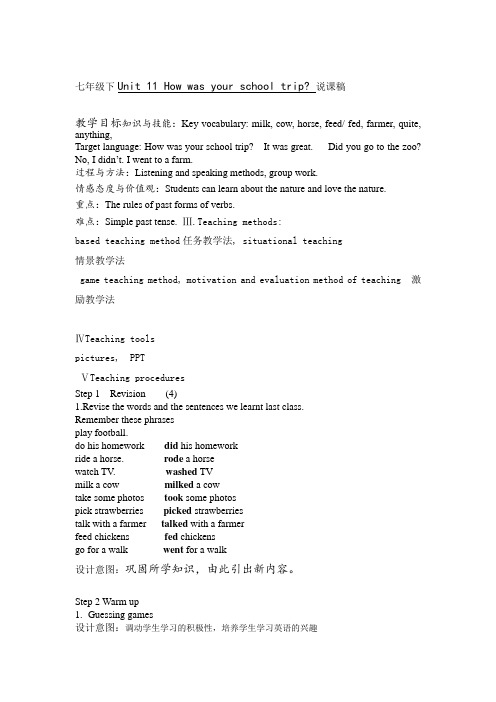
七年级下Unit 11 How was your school trip? 说课稿教学目标知识与技能:Key vocabulary: milk, cow, horse, feed/ fed, farmer, quite, anything,Target language: How was your school trip? It was great. Did you go to the zoo? No, I didn’t. I went to a farm.过程与方法:Listening and speaking methods, group work.情感态度与价值观:Students can learn about the nature and love the nature.重点:The rules of past forms of verbs.难点:Simple past tense.Ⅲ.Teaching methods:based teaching method任务教学法, situational teaching情景教学法game teaching method, motivation and evaluation method of teaching 激励教学法ⅣTeaching toolspictures, PPTⅤTeaching proceduresStep 1 Revision (4)1.Revise the words and the sentences we learnt last class.Remember these phrasesplay football.do his homework did his homeworkride a horse. rode a horsewatch TV. washed TVmilk a cow milked a cowtake some photos took some photospick strawberries picked strawberriestalk with a farmer talked with a farmerfeed chickens fed chickensgo for a walk went for a walk设计意图:巩固所学知识,由此引出新内容。
七年级英语下册Unit11Howwasyourschooltrip说课稿1新版人教新目标版
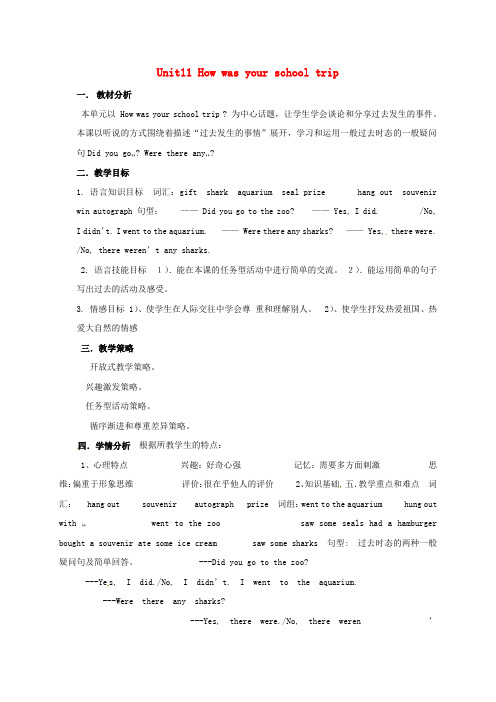
Unit11 How was your school trip一.教材分析本单元以 How was your school trip ? 为中心话题,让学生学会谈论和分享过去发生的事件。
本课以听说的方式围绕着描述“过去发生的事情”展开,学习和运用一般过去时态的一般疑问句Did you go…? Were there any…?二.教学目标1. 语言知识目标词汇:gift shark aquarium seal prize hang out souvenirwin autograph 句型:—— Did you go to the zoo? —— Yes, I did. /No,I didn’t. I went to the aquarium. —— Were there any sharks? —— Yes, there were./No, there weren’t any sharks.2. 语言技能目标1).能在本课的任务型活动中进行简单的交流。
2).能运用简单的句子写出过去的活动及感受。
3. 情感目标 1)、使学生在人际交往中学会尊重和理解别人。
2)、使学生抒发热爱祖国、热爱大自然的情感三.教学策略开放式教学策略。
兴趣激发策略。
任务型活动策略。
循序渐进和尊重差异策略。
四.学情分析根据所教学生的特点:1、心理特点兴趣:好奇心强记忆:需要多方面刺激思维:偏重于形象思维评价:很在乎他人的评价 2、知识基础五.教学重点和难点词汇: hang out souvenir autograph prize 词组:went to the aquarium hung outwith … went to the zoo saw some seals had a hamburger bought a souvenir ate some ice cream saw some sharks 句型: 过去时态的两种一般疑问句及简单回答。
新目标英语七年级下册第十一单元Unit11:Whatdoyou

新目标英语七年级下册第十一单元Unit11:Whatdoyou新目标英语七年级下册第十一单元Unit 11: What do you think of game shows?英语教案新目标英语七年级下册第十一单元Unit 11: What do you think of game shows? Language goals to this unit students learn to state their opinions and talk about likes and dislikes. New language What do you think of soap operas? I dont like soap operas. What does he think of sports shows? He loves sports shows. What does she think of Maria? She likes Maria. What do they think of Tommy? They cant stand Tommy. Section A Additional materials to bring to class: a local television listing list the names of several foods on the board.For example: pizza, broccoli, ice cream, mushrooms. Next to that list, write the sentence, What do you think of ___ ? and leave a blank at the end. Ask a student the question, substituting the word pizza: What do you think of pizza? Help him or her answer / like pizza ot I dont like pizza, Point to the other foods one by one. Ask a student the question and help him or her answer J like...or I dont like.... Then point to the sentence. What do you think of ___ ? Point to a food name on the board and choose a student to ask the question: What do you think of (mushrooms)? Then point to a student to answer. Repeat the activity several times, giving several students chances to ask and answer the question. 1 a This activity introduces the key vocabulary. Focus attention on the five TVs. Say, Each TV shows different kind of TV show. In TV picture a, there is a an playing baseball. This is called a sports show. Talk about the other kinds of shows and ask students what they see. Tell the name of each kind of show as you discuss the picture. Ask students to repeat the names of the shows. Write the wordsitcom on the board. Under it write the words situation comedy. Say, The word sitcom comes from the two words situation comedy. A sitcom is a funny show. The people in sitcoms do or say things that make TV watchers laugh. Point out the numbered list of shows. Say each one again and ask students to repeat it. Then ask students to match each TV picture with one of the words. Say, Write the letter of each kind of show next to the correct word. Point out the sample answer. 1 b This activity gives students practice in understanding the target language in spoken conversation. Point to the smiley faces and the frowny faces and the words next to them. Read the words to the class or have a student do this. Say, These faces show you what the words mean. If you dont mind something, you dont either like it or dislike it. If you cant stand something, you dislike it very strongly. Your least favorite food is something you cant stand. If you love something, you like it very, very much. Your favorite food is something you love. Say, Now I will play a recording. Listen to what Mark says about the TV shows in la. Write the letter of the TV shows next to the words he uses. Play the recording the first time. Students only listen. Play the recording a second time. Point to the lettered pictures. Say, Each picture has a letter. Point out the blank spaces before the words. Say, Each word or phrase has a space in front of it. Listen to the tape and write the letter of a TV show picture in each blank. Point out the sample answer. Correct the answers.1 c This activity provides guided oral practice using the target language. Point to the pictures of TV shows in activity la and ask students to say the name of each kind of show. Point out the example conversation. Ask two students to read it to the class. Then ask the class to point to the picture of the sitcom. Say a dialogue with a student. Have the student ask ou a question.Then answer it truthfully. Point to the ppropriate picture as you answer. Say, Now work with a partner. Ask and answer the qstions. Have students work in pairs. As they talk, move round the room monitoring their work. Offer anguage or pronunciation support as needed. 2a This activity provides listening practice using the target language. Call attention to the list of five words and expressions.Point out the blank in front of each one. Ask a student to read the list to the class. Say, The people on the recording are talking about TV shows. They use these words and phrases as they talk about the shows. You will number these words and phrases 1-5 in the order you hear them on the recording. Play the recording the first time. Students only listen. Point out the sample answer 1 in front of the word love. Say, The first word on the recording is love in the sentence I love it. So the answer in front o/love is number 1. Play the recording again. Ask students to write a number from 1 to 5 in front of each of the words and phrases. Check the answers. 2b This activity provides more listening practice using the target language. Point out the dialogue with blanks. Read it to the class saying blank each time you come to a blank. Say, Listen to the recording again. This time/ill in each blank with a word or phrase from the list in 2a. Play the recording. Students write words in the blanks. Check the answers. 2c This activity provides guided oral practice using the target language. Call attention to the dialogue students completed in activity 2b. Say, Read the dialogue with a partner. \\ Help students find partners. Have the students practice the dialogue several times. Then say, Now talk about a TV show you both know.Tell what you like and dont like about the show and the people in it. As students work together, move around the room answering questions and offering language sup- sport asneeded. Ask some pairs of students to present their dialogue!to the class. 3a This activity provides pral and writing practice using the target language. Call attention to the list of TV shows and ask a student to read the names to the class. Say, In this activity you ask each other questions about TV shows. Ask students to work in pairs. Ask student A in each pair to look at the chart on page 67. Ask student B to look at the chart on page 86. Remind students not to look at their partners pages. Say the first question and answer with a student. Pretend you are student A and work with a student partner.Say What does Stuart think of Sports News? Have student B look at the answer on his or her chart on page 86.Student B answers, Stuart loves Sports News. Show students that you are writing in the word loves after Stuarts name on the chart on page 67. Then say to your partner, Ask me about Stuart Student B asks, What does Stuart think of Sports News? You answer, Stuart likes Sports News. Have the student write the word likes after Stuarts name on the chart on page 86. Ask the pairs to continue on their own. Move around the room monitoring the progress of the pairs. Go over the answers. 3b This activity provides guided reading practice using the target language. Read the dialogue with a student. Every time one of you conies to a blank, say blank. Call attention to the chart students completed in activity 3a. Say, Use the words in this chart to fill in the blanks in the dialogue in activity 3b. 4 This activity provides listening, speaking, and writing practice using the target language. Read the instructions to the class. Then ask students to name some TV shows they know about. Write the list on the board. Try to include some that students like and some they dont like. Point out the dialogue in the speech bubbles. Have two students read it to the class. Then point out the sample answerin the chart. Say,This TV show is called Tell it like it is! I love it, and Lin Peng does, too. I write I love it under What I think and I write Lin Peng under Student who agrees with me. Say, Now go around the class. Ask students about TV shows you know. Find students who agree with you. After five minutes ask students to sit down. Then ask some students to read the information from their charts to the class. Ask students to make statements such as I dont like The Crime Files. Carlos doesnt like The Crime Files, too. Alternative: If you do not wan。
新目标英语七年级下UNIT11教案

新目标英语七年级下UNIT11教案一、教学内容本课程为新目标英语七年级下UNIT11的教学内容。
本单元主要介绍了关于“世界足球明星”以及与足球相关的词汇和表达方式。
二、教学目标1.学会用英语谈论自己喜欢的足球明星。
2.学会用英语询问他人喜欢的足球明星。
3.学会用英语表达对足球明星的喜爱和认同。
4.学会理解并运用本单元所学的生词和短语。
三、教学重点1.学会用英语表达自己对足球明星的喜爱和认同。
2.学会用英语询问他人喜欢的足球明星。
四、教学难点1.能够灵活运用所学的词汇和表达方式,进行口语对话。
2.能够正确理解并使用本单元所学的语法和句型。
五、教学准备1.教师准备:PPT、教学课件、小黑板、足球明星海报、足球明星照片等。
2.学生准备:课本、笔、笔记本。
六、教学步骤1. 导入新课(5分钟)教师展示足球明星的照片或海报,并引入话题:“Do you like football? Who is your favorite football player?”教师可以先示范,然后邀请学生回答。
鼓励学生口头表达。
2. 学习新词汇(15分钟)教师通过PPT或教学课件展示本单元所学的足球相关词汇,并进行讲解和示范。
学生可以一边听讲一边进行词汇的拼写和标记。
•football(n.)- 足球•player(n.)- 球员•team(n.)- 队伍•goal(n.)- 进球•kick(v.)- 踢•game(n.)- 比赛•win(v.)- 赢•lose(v.)- 输•famous(adj.)- 著名的•favorite(n.)- 最喜欢的3. 基本句型学习(20分钟)教师通过示范和练习,引导学生掌握以下基本句型:•A: Who is your favorite football player? B: My favorite football player is [name].•A: Do you like [name]? B: Yes, I do. / No, I don’t.•A: Does he/she play in a team? B: Yes, he/she does. / No, he/she doesn’t.•A: Does he/she often win? B: Yes, he/she does. / No, he/she do esn’t.4. 听力练习(15分钟)教师播放与课文相关的录音,并配上相应的题目。
新目标英语七年级下册Unit 11 What do you think of game shows 第一课时教案

Unit 11 What do you think of game shows ?Period OneTeaching material : Unit 11 ( Grade Seven , “ Go for it ” )Content: Section A 1a to 1c of Unit 11Analysis of teaching material :In this unit , students will learn to give opinions and talk about likes and dislikes . In the first period ,students will learn five kinds of TV shows and talk about their preferences .Analysis of students :Students learned “ I like / don’t like …” in unit 6 “ Do you like soccer ball ” .In this unit , we’ll go on to talk about likes and dislikes . Students are interested in TV shows , I think they will active to talk about their preferences .Teaching Aims :Teaching key points :1.The names of TV shows in la2.The target languageTeaching difficulties :How to use “ What do you think of … ?I don’t mind . / I can’t stand . / I love…. ”Teaching method :1.Listening2.Practice method3.Groupwork4.Singing an English songTeaching aids :1.A multimedia2.A tape recorderTeaching Steps :Ⅰ. Greeting and leading inHappy Camp—a kind of TV showsⅡ. Presentation1.Learn the new words by showing pictures (1a)talk show , soap opera , sports show , sitcom , game show2.Present the target languageA : What do you think of …?B : I love / like / don’t mind / don’t like / can’t stand it / them.3.Practice : Ask and answer in pairs , then ask several pairs to act itout.(1c)Ⅲ. Listen and read ( 1b )Ⅳ. Brainstormgame shows ArrayⅤ. Groupwork : Interview and fill in the form .Topic:____________Ⅵ. SummaryⅦ. Sing a songⅧ. Homework :Interview your parents / your brother / sister / grandparents … , and make some conversations using “ What do you think of …”Post-teaching notes :。
七年级英语下册Unit11Howwasyourschooltrip说课稿2新版人教新目标版
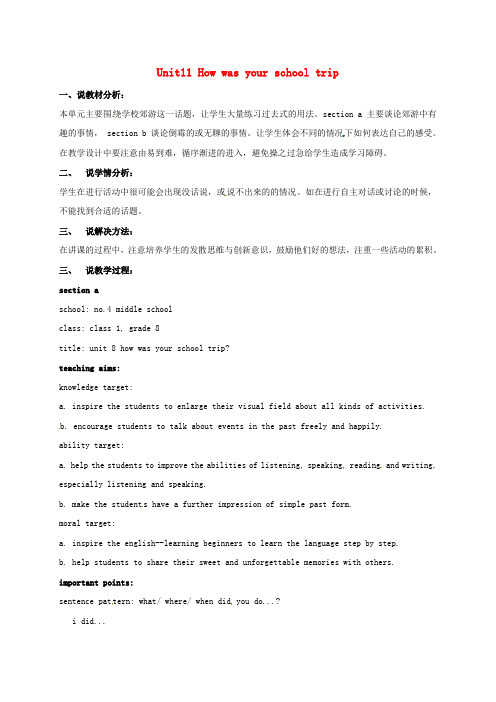
Unit11 How was your school trip一、说教材分析:本单元主要围绕学校郊游这一话题,让学生大量练习过去式的用法。
section a 主要谈论郊游中有趣的事情, section b 谈论倒霉的或无聊的事情。
让学生体会不同的情况下如何表达自己的感受。
在教学设计中要注意由易到难,循序渐进的进入,避免操之过急给学生造成学习障碍。
二、说学情分析:学生在进行活动中很可能会出现没话说,或说不出来的的情况。
如在进行自主对话或讨论的时候,不能找到合适的话题。
三、说解决方法:在讲课的过程中,注意培养学生的发散思维与创新意识,鼓励他们好的想法,注重一些活动的累积。
三、说教学过程:section aschool: no.4 middle schoolclass: class 1, grade 8title: unit 8 how was your school trip?teaching aims:knowledge target:a. inspire the students to enlarge their visual field about all kinds of activities.b. encourage students to talk about events in the past freely and happily.ability target:a. help the students to improve the abilities of listening, speaking, reading and writing, especially listening and speaking.b. make the student s have a further impression of simple past form.moral target:a. inspire the english--learning beginners to learn the language step by step.b. help students to share their sweet and unforgettable memories with others. important points:sentence pat tern: what/ where/ when did you do...?i did...difficult points:a. the past form of the verbs.b. let students ask and answer the events in the past.teaching strategies:a. task-based approachb. situational methodc. audio-lingual methodteaching instrument:recordermulti-media computerteaching p rocedure si. warm-up activit y:(present tense──past tense)a. ask students if they will have a school trip, what they want to do. help students think out as many activities as they can and write the activities on the blackboard. (brain storm)b. question: did you do these activities last school trip? so we can say i did ... last school trip. (help students to change the verbs into the past form. and practice the simple past form sentences. )ii. presentation:a. listening 1b and do the pairwork of 1ca: did tina do ...?b: no, she didn't. her friend did ...b. listening 2a, 2buse the form on the multi-media computer.name what else did tina do on the school trip? tina toby laurac. dialogueit is time for dialogues. give students three topics to make their dialogues.(1) last school trip(2) last vacation(3) last weekend students should use the sentence patterns: where did you go? what did you do? who did you go with?d. reading 3afirst, ask students to read the article. then work in groups to talk about the things they cannot understand. if they still have questions after discussing, the teacher will help them.second, correct the statements under the reading. then check the answers.third, retell the story. give some pictures on the multi-media computer. ask students to look at the pictures to retell the story.e. game: circle storyput eight questions on the multi-media computer. ask students to make up their own story according to the questions.f. conclusioniii. homework: write a composition about your last school trip.blackboard design。
七年级英语下学期Unit11 What do you think of 说课课件 人教新目标版

(二)教学重点和难点
教学 1.掌握词汇
重点 : 2. 功能:1)让学生能够谈论表达不同程 度的喜好,并学习 如何发表自己的见 解,倾听并转诉他人对人、事的态度 和看法,并能运用已有的语言知识简 单阐明理由。2) What do you think of….?句式在不同人称中的使用及其 几种不同的答语方式.3)掌握运用love, like, don’t like, can’t stand, don’t mind 恰当表达对有关事物的观点和 态度.
(2)设计多种任务活动,提供给学生合作交流 的 空间和时间,促使学生为完成任务和同学进 行合作,为完成任务进行探究学习。 2.学习策略
接着从对节目的看法过渡到对节目中 人物的看法。然后教材设计了谈话类节 目中主持人与嘉宾的一段对话,并借此 突出本单元主要语法知识:What do you think of …? 及其回答;之后的一个 对电视节目的调查起到了引导学生初步 综合运用所学语言的作用,以调查的形 式使学生在活动中主动运用语言。
Section B 具体让学生对各类流行饰品发表见 解。通过3a 中六位学生对饰品的不同理解,然后 让学生谈谈自己对这些时尚饰品的看法。Self check部分通过一位外国老太太对生活的态度,对 时尚的追求的一篇文章,让学生发表自己的见解, 是如何理解外国老太太的做法。
综上所述,本单元以发表见解为主线,围绕 着谈论电视节目、人物和时尚物品等语言功能项 目展开了一系列任务活动。教材内容从基本语言 知识到语言综合运用层层递进,听说读写依次展 开,以一种循序渐进的学习程序,引导学生在做 事中有目的的学习语言。
教学难点: 掌握运用love, like, don’t like, can’t stand, don’t mind 恰当表达对有关 事物的观点和态度
- 1、下载文档前请自行甄别文档内容的完整性,平台不提供额外的编辑、内容补充、找答案等附加服务。
- 2、"仅部分预览"的文档,不可在线预览部分如存在完整性等问题,可反馈申请退款(可完整预览的文档不适用该条件!)。
- 3、如文档侵犯您的权益,请联系客服反馈,我们会尽快为您处理(人工客服工作时间:9:00-18:30)。
新目标英语七年级下Unit 11 说课稿
Unit 11 What do you think of game shows?
一、教学背景分析
(一)教学内容分析
本单元的中心话题是“发表意见”,具体涉及电视节目,时尚流行,以及学生围绕电视节目和时尚饰品谈论不同程度的喜好,并发表见解。
语言技能和语言知识几乎都围绕“发表见解”这一中心话题设计的。
Section A 所呈现的是各类电视节目以及与此相关的基本语言知识及其初步运用。
这部分内容从呈现电视节目开始,通过视、听等方式输入信息,并引出本单元主要句型:What do you think of …?I love / like / don’t / mind / can’t stand them /it/ her/him.
接着从对节目的看法过渡到对节目中人物的看法。
借此突出本单元主要语法知识:What do you think of …? 及其回答;之后的一个对电视节目的调查起到了引导学生初步综合运用所学语言的作用,以调查的形式使学生在活动中主动运用语言。
综上所述,本单元以发表见解为主线,围绕着谈论电视节目、人物和时尚物品等语言功能项目展开了一系列任务活动。
教材内容从基本语言知识到语言综合运用层层递进,听说读写依次展开,以一种循序渐进的学习程序,引导学生在做事中有目的的学习语言
(二)教学重点和难点
教学重点
1.掌握词汇
2.功能:1)让学生能够谈论表达不同程度的喜好,并学习如何发表自己的见解,倾听并转诉他人对人、事的态度和看法,并能运用已有的语言知识简单阐明理由。
2) What do you think of….?句式在不同人称中的使用及其几种不同的答语方式.
3)掌握运用love, lik e, don’t like, can’t stand, don’t mind 恰当表达对有关事物的观点和态度
教学难点:
掌握运用love, like, don’t like, can’t stand, don’t mind 恰当表达对有关事物的观点和态度
三)教学目标
《新课程标准》之基础教育阶段英语课程的总体目标是培养学生综合语言运用能力,而这种语言运用能力的形式是建立在语言知识、语言技能、情感态度、学习策略和文化意识的整体发展基础上的,根据本单元教学内容和学生知识结构及认知特点,本单元的教学目标确定为:
1.语言知识目标
词汇:
能理解、运用以下生词soap,, sitcom, mind, fashion, idea, stand
短语:think of, soap opera, talk show, sports show ,don’t mind, can’t stand, game show
功能:
1)让学生能够谈论表达不同程度的喜好,并学习如何发表自己的见解,倾听并
转诉他人对人、事的态度和看法,并能运用已有的语言知识简单阐明理由。
2) What do you t hink of….?句式在不同人称中的使用及其几种不同的答语方式.
3)掌握运用love, like, don’t like, can’t stand, don’t mind 恰当表达对有关事物的观点和态度.
2.语言技能目标
听:
能捕捉特定信息,抓住关键词(如can’t stand ,don’t mind 等)
说:
能熟练掌握与话题相关的常用词汇与表达.如:如何用英语来表达自己对事物的不同意见,如何表达自己对事物不同程度的喜好,以提高在真实语境中的英语交际能力.
3.学习策略目标:
学生能在一定程度上形成自主学习、有效交际、用英语思维和发表意见的能力,以及搜索、筛选信息的能力。
如:对中央电视台各类电视节目的收视率展开调查等活动,使学生在做中学英语。
4.情感态度目标
1)让学生了解各类电视节目,对各类电视节目有筛选性的进行收看。
2)引导学生用得体的语言表达不同程度的喜好,培养发表不同见解的能力。
3 通过小组合作、调查等活动来培养学生合作与共享的学习习惯。
二、教学方法和学习策略
1.教法:
(1)本单元话题源自生活,立足这一点,充分利用学生已有的知识和经验,创设生活化的真实情境,引导学生在运用中学习语言,然后在学习新的语言知识后创造性地运用语言(为用而学,在用中学,学了能用)。
(2)设计多种任务活动,提供给学生合作交流的空间和时间,促使学生为完成任务和同.学进行合作,为完成任务进行探究学习。
2学习策略:在与同学合作完成任务的活动中主动探究和学习语言。
(1)一、创设情景,以旧引新
T:Do you like movies?
S: Yes. I like them very much..
T: What kinds of TV shows do you know?
S: (T helps) talk shows, sports shows, game shows, sitcoms, soap operas, ne ws, ads.
边教新词,边放相应的电视节目,让学生更直观、形象的理解各类电视节目
二、巩固语言,结对操练
1.教师讲关于自己对各类电视节目不同程度的喜好,突出love, like, don’t like, don't mind, can’t stand 这几个词所表达的不同程度,让学生再次直观的体验他们的不同程度。
T: I like.., because…, but I can’t stand….
What do you think of them? Ask and answer in pairs.
A: What do you think of game shows/…?
B: I love/like/don’t like/don’t mind/can’t stand them?
A: Why do you think so?
B: Because they are exciting/…
Homework:
1.Write your report.
2.搜索自己喜欢的电视节目的相关资料(包括电视栏目,主持人等).。
